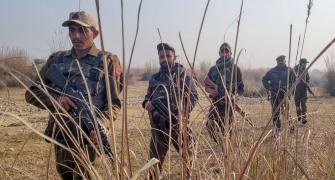Sikh militants had in 1986 threatened to kill then Canadian Prime Minister Brian Mulroney and blow up the Toronto subway system, according to declassified documents presented before the Air India inquiry commission.
An anonymous letter received by police in early July 1986 laid out the terrorist attacks that would unfold if Talwinder Singh Parmar, who mastermind the Kanishka bombing that left 329 people dead, and others in jail at the time were not released.
On July 8, 1986, the first indication of retaliation against the Canadian government emerged in the form of an anonymous letter to kill Prime Minister Mulroney, carry out blasts in the Toronto subway system, movie theatres, banks and commercial malls, says an Royal Canadian Mounted Police letter outlining the threat, National Post reported on Friday.
The letter to a counterpart at the Canadian Security Intelligence Service is among thousands of formerly secret papers just released as part of the massive disclosure at the Air India inquiry.
Parmar had been arrested in June 1986, along with five Hamilton members of the Babbar Khalsa, and charged with plotting acts of terror in India. They were later acquitted.
The RCMP had in a letter warned that there might be other acts of retaliation in Canada because of a series of arrests in different cases.
Recent law enforcement actions in fact may cause an escalation in violence on the part of Sikhs sympathetic to the Khalistan movement, says the letter, signed by Chief Superintendent J A N Belanger.
'It is our concern that all necessary action is taken to prevent the commission of further criminal offences by Sikh extremists in this country. It is considered critical that our two agencies co-operate closely in this regard so that our resources are effectively deployed and there is no duplication of effort or inadequate coverage on any issue,' the letter said.
Whether CSIS-RCMP co-operation was adequate at the time is a key part of the mandate of the Air India inquiry, headed by retired Supreme Court Justice John Major.
The letter, which is addressed to Chris Scowen, CSIS deputy director of counter-terrorism, says the arrests had not made a dent in either the Babbar Khalsa or the International Sikh Youth Federation.
There appears to have been no abatement in activity among the Canadian ISYF and Babbar Khalsa members since the recent arrests in Montreal, Vancouver and Hamilton. In fact, there have been certain indications that Sikh extremist activity worldwide may soon escalate and intensify, Belanger wrote.
Large parts of the RCMP letter are completely blacked out, including most of the section on Ripudaman Singh Malik, the Vancouver businessman acquitted in the Air India bombing.
The RCMP is currently reviewing all intelligence/information on Ripudaman Singh Malik, the letter says. We would appreciate your assessment of Malik's relationship with the Babbar Khalsa and Parmar.
It says that police have received intelligence linking Canadian Sikhs with plans to acquire specialized training, firearms, explosives and funds for the Khalistan cause.






